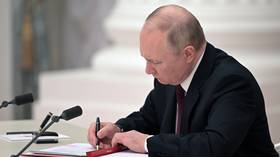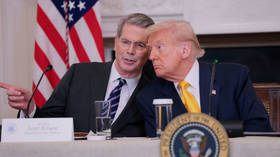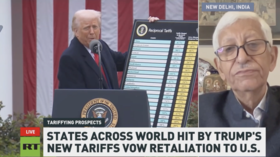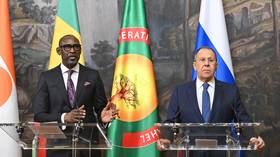Kremlin reveals how borders of Donbass republics will be defined
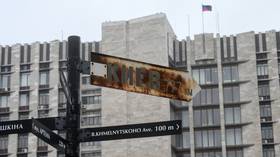
Russia will acknowledge the borders of the two breakaway republics of Donetsk and Lugansk in line with where local leaders exercise authority and jurisdiction, the Kremlin has announced, after Moscow formally recognized the two regions as independent states. At present, Ukrainian forces control large swaths of the territory to which the separatist leaders lay claim.
Speaking to reporters on Tuesday, Russian President Vladimir Putin’s spokesman, Dmitry Peskov, explained that Moscow would support the Donbass republics in their territorial dispute. That meant acknowledging them “within the parameters they declared themselves,” he said. He added that this would be dependent on “when the two republics were proclaimed,” but declined to provide further information.
Deputy Foreign Minister Andrey Rudenko later added that Moscow will respect the borders as local leaders exercise authority and jurisdiction.
The remarks came less than a day after Putin announced that, amid escalating tensions in eastern Ukraine, Moscow would affirm the two breakaway Donbass regions as sovereign nations. Last week, amid what they claimed was a sharp spike in hostilities, Donetsk and Lugansk announced that they had begun evacuating residents to Russia and had ordered the mobilization of all able-bodied men, should conflict break out.
In recent days, both Kiev’s army and those loyal to the two separatist territories have accused each other of instigating aggression in the form of heavy shelling across the contact line. However, Ukraine has rejected allegations that it is preparing to attack, with Alexey Danilov, the secretary of the country’s National Security and Defense Council, claiming “there is an attempt to provoke our forces,” and that Kiev’s troops would open fire only “if there is a threat to the lives of our service members.”
The two republics declared their autonomy from Ukraine in 2014, in the wake of the Maidan revolution, when violent street demonstrations overthrew the elected government. Kiev has long insisted the separatists in the region are Russian-backed – an accusation Moscow has denied. At present, Ukrainian government forces effectively control over half the territory in the Donbass that had been part of the Donetsk and Lugansk regions before the split.
In recent months, Western officials have sounded the alarm that Moscow could launch an offensive against Ukraine. US President Joe Biden expressed concern last week that the uptick in fighting could be the beginning of a “false flag” operation, giving Russia’s armed forces an “excuse to go in” and invade its neighbor. The Kremlin has consistently denied it has any plans to launch such an incursion, however.
